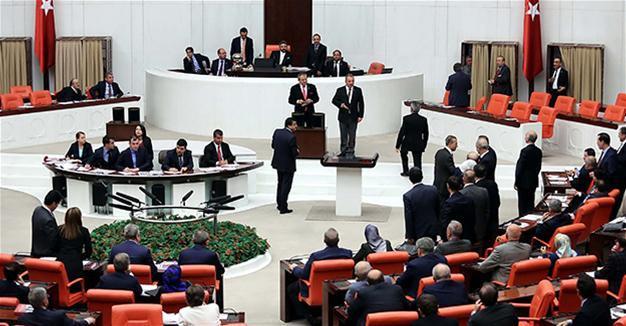Turkish Parliament to finalize charter talks this week
ANKARA

DHA photo
Turkey’s parliament will conclude its work on a government-led charter draft this week, paving the way for a possible referendum.The first round of talks on the amendments, which will convert the country’s current parliamentary system into a presidential one, was expected to end late on Jan. 15. The second round, which consists merely of the voting on the articles and the draft as a whole, will be held at least 48 hours after the first round is concluded, with expectations that it will be held on Jan. 18.
If at least 330 of the 550 lawmakers approve the articles, the changes will be posed to the public in a referendum. Any article that remains below the 330 vote threshold in the second round will be left out of the package, regardless of the result of the first round vote.
Parliament had a long night on Jan. 14, starting its session at around 2 p.m. and concluding it at 6 a.m. on the morning of Jan. 15.
In the session, five more articles of the package were approved, bringing the total number of approved articles to 16.
The remaining two articles of the 18-article package were expected to be approved late on Jan. 15.
Among the articles approved on the morning of Jan. 15 were those addressing structural reforms in the nation’s highest judicial body, regulations of the annual budget and a new government system.
Turkey’s Supreme Council of Judges and Prosecutors (HSYK), which currently has 22 regular and 12 substitute members, will have just 13 members in the new system approved by the lawmakers.
The new body will be renamed the Judges and Prosecutors’ Council, and will be chaired by the justice minister.
Three members of the council will be elected by the country’s president while the remaining members will be elected parliament. Elections to the council will be held every four years and members can be re-elected.
According to another approved article, expenditures of public entities will be made in accordance with the annual budget.
The country’s president will be required to submit a budget proposal to parliament at least 75 days before the start of the new fiscal year. The proposal will be discussed by parliament’s budget commission.
The lawmakers also approved the abolition of military courts except for disciplinary ones.
The draft charter discussed in parliament is supported by the ruling Justice and Development Party (AKP) and the opposition Nationalist Movement Party (MHP).
Lawmakers of the main opposition Republican People’s Party (CHP), which argues that the proposed charter articles entail a regime change for the country and put too much power in one person’s hand, have voted against the draft while the Peoples’ Democratic Party (HDP) has boycotted the votes to protest the arrest of 11 of its lawmakers, including the party’s co-chairs.
The AKP has 316 seats in parliament while the MHP has 39, more than enough to obtain the 330 votes needed for a referendum.
If the draft receives at least 367 votes, it may go into effect without a referendum, but President Recep Tayyip Erdoğan said he would use his authority to call for a referendum even if parliament gives its approval with a two-thirds majority.
The current constitution and election laws stipulate that a referendum must be held within 60 days after a referendum is announced by the president.
Turkey’s Supreme Election Board (YSK) has already started preparations for a possible referendum, with the most likely date being April 2, daily Hürriyet reported on its website on Jan. 15.
According to the report, the YSK is ready to hold the referendum on April 9 at the latest, and the ballots for the vote have already been ordered. A white ballot will be used for a “yes” vote in the referendum, while the “no” vote ballot is expected to be brown.
















